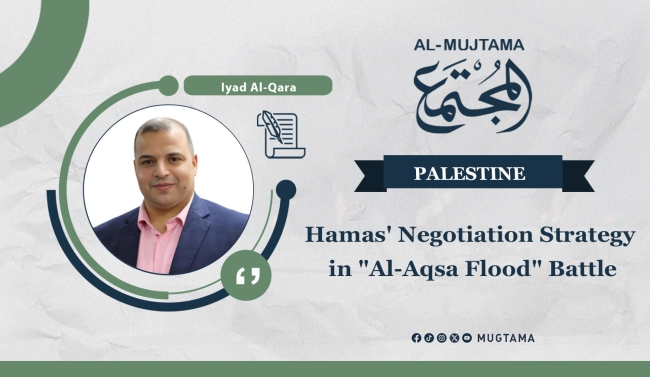Hamas' Negotiation Strategy in "Al-Aqsa Flood" Battle
On October 7, 2023, the Islamic Resistance Movement (Hamas) executed a high-profile military operation that marked a strategic turning point in the Palestinian cause. The operation, meticulously and secretly planned by Hamas under the supervision of its leader Yahya Sinwar, resulted in significant impacts on the battlefield and politics, taking hundreds of Israeli soldiers as casualties and wounded; this sparked widespread international reactions.
Complex negotiation
The battle opened up complex negotiation files between Hamas and the "Israeli" occupation, with these negotiations being conducted through regional and international mediation. The topics at hand include prisoner issues, a ceasefire, the return of displaced individuals, and the lifting of the blockade on the Gaza Strip. The principal mediators in these negotiations are Qatar and Egypt, with international parties such as the United States, France, and Turkey joining the efforts.
The issue of prisoners holds a central place in the negotiations, as Hamas retains a significant number of "Israeli" prisoners, which it uses as a primary leverage tool in the "Al-Aqsa Flood" battle. The occupation has acknowledged the death of several prisoners during failed attempts to free them, leading to increased internal pressure on the Israeli government.
Foundations of Hamas' Negotiation Strategy
Hamas relies on its position as the largest military and political force in the Gaza Strip since it took control in 2007. The victory of Hamas in the 2006 Palestinian legislative elections enhances its popular legitimacy, allowing it to impose its negotiation terms based on its military strength and field control.
Hamas adopted the principle of indirect negotiations since its establishment in the late 1980s. Despite its refusal to recognize the legitimacy of the occupation, it has not opposed negotiating through intermediaries to achieve short-term objectives. For instance, the Shalit deal in 2011, during which over 1,000 Palestinian prisoners were released in exchange for the Israeli soldier Gilad Shalit, exemplified the indirect negotiation approach embraced by Hamas.
Flexible tactics are a prominent feature of Hamas' strategy, as it has demonstrated adaptability in dealing with political changes. In its amended document in 2017, the movement accepted the establishment of a Palestinian state based on the 1967 borders as a temporary solution, despite rejecting the recognition of "Israel." This adaptability to regional and international changes has showcased Hamas' ability to exploit political opportunities to strengthen its negotiation position.
Negotiation Goals and Strategies
Through its negotiations, Hamas aims to achieve humanitarian and political gains, such as halting aggression, returning displaced individuals, and lifting the blockade on the Gaza Strip.
Using the prisoner issue as a pressure tool seeks to secure tangible humanitarian gains, taking advantage of the increasing international pressure on "Israel" to calm the situation in Gaza.
Hamas recognizes that time works in its favor in the conflict with the occupation. The ongoing military and economic losses faced by the "Israeli" army weaken its negotiation position and enhance Hamas' ability to endure and manage a long-term war despite significant sacrifices. This approach is reflected in its capacity to use time as leverage to improve negotiation terms.
Hamas relies on intermittent military escalation as a means to improve its negotiating terms. In November 2023, it demonstrated flexibility in humanitarian negotiations for the release of a number of prisoners, which helped relieve international pressure on it and improve its negotiating conditions. This dual tactic of escalation and flexibility reflects Hamas's ability to manage the conflict effectively.
Regional and International Role
Qatar plays an active mediating role in the negotiations, providing significant support to Hamas, which enhances its capacity to continue resisting the occupation. Qatar, considered a primary financial and political supporter, contributes to strengthening Hamas's negotiating position. Turkey also plays an important role in providing political and diplomatic cover for the movement, enhancing its ability to maneuver on the international stage.
Despite being classified as a terrorist organization by the United States and the European Union, this designation has not prevented intermediary parties from engaging in negotiations to achieve a ceasefire in the region. The international community's role is to pressure Israel to comply with humanitarian and international standards, which enhances Hamas's position in the negotiations.
Challenges and Constraints
Hamas faces significant challenges from the occupation, which seeks to undermine its negotiating leverage through the dissemination of misleading information and spreading rumors. The Zionist strategy focuses on prolonging the war and destroying infrastructure in Gaza to deter resistance and weaken its capacity to endure. The occupation's strategy relies on destroying Gaza's infrastructure as a means to deter Hamas and force it to make concessions in negotiations. This approach reflects the occupation's ongoing attempts to undermine Hamas's ability to continue resisting.
Hamas has benefited from previous negotiation experiences, such as the Shalit deal, where it achieved significant gains despite pressures. These experiences demonstrated Hamas's ability to use negotiation as a tool to achieve its political and humanitarian goals. In the "Tsunami of Al-Aqsa" battle, Hamas efficiently managed negotiations, showcasing the occupation's failure to achieve its objectives, as acknowledged by Zionist leaders such as General Isaac Brik.
Conclusion
Hamas's negotiating strategy relies on its military and political strength, with tactical flexibility that enables it to adapt to regional and international changes. Despite ongoing military escalation, the movement seems determined to achieve its national goals, supported by significant popular and regional backing, and a negotiating management that has proven effective in facing the occupation. Its ability to manage time and leverage international support places it in a strong position to continue resistance and strive for tangible political and humanitarian gains.


